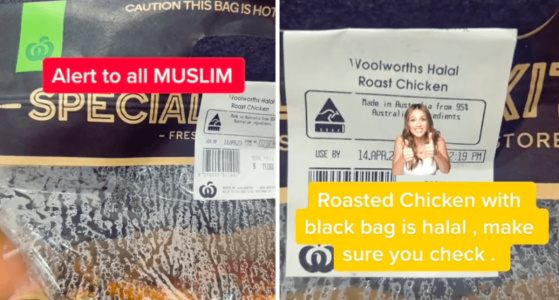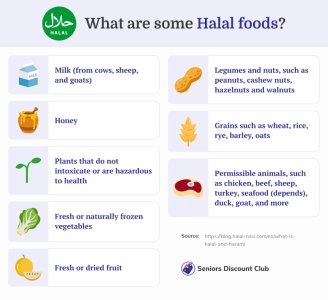The secret behind Woolworths' roast chooks in black packaging
- Replies 45
Imagine this - you're at your local Woolworths, picking up one of their famous Hot Roast Chickens for a quick and easy dinner. But as you reach for your usual yellow bag, you notice something strange - the bag is completely black. How strange?
Well, as it turns out, there's a fascinating reason behind it! A curious customer decided to investigate and discovered that if the chicken is in a black bag, it is Halal-certified.
They shared this exciting revelation on social media, and it quickly gained traction among Woolies shoppers who were intrigued by this little-known fact.

But first, let's talk more about what it means for food to be Halal. Halal is an Arabic word that translates to 'permissible' in English, and it refers to food that is considered lawful or allowed under Islamic law.
In general, Islam considers every food to be Halal unless it is specifically prohibited in the Quran or hadith. Halal foods are made, produced, manufactured, processed, and stored using machinery, equipment, and/or utensils that have been cleaned according to Islamic law (shariah).
They are also free from any component that Muslims are prohibited from eating according to Islamic law.
One of the most well-known examples of non-Halal food is pork, which is categorically prohibited for Muslims to consume.
However, there are other criteria for non-Halal items, including their source, the cause of the animal's death, and how it was processed. For example, some Islamic scholars consider shellfish and other seafood to be Halal, while others do not.
It's worth noting that vegetarian cuisine can also be Halal, as long as it does not contain alcohol or any other prohibited ingredients.
It's important to note that in Islamic teachings, animals are considered to be sacred and must be treated with respect and care. As a result, the goal of Halal-style butchery is to minimise the amount of pain that the animal will endure during the slaughter process.

During the slaughter, the jugular vein of the animal is cut, and the blood is allowed to drain from the body. This practice is done because Muslims are not permitted to consume animal blood. Before the slaughter, the animal must also be given food and water, and be free from any illness, and no other animal should witness the slaughter.
Additionally, because pork is forbidden, Halal slaughter cannot take place where pigs are slaughtered.
By following these guidelines, the Halal slaughter process ensures that the animal is treated with dignity and care. And Muslims who follow these dietary restrictions can have confidence that the meat they consume has been prepared in a way that aligns with their religious beliefs.
According to a Woolworths spokesperson, the Halal-certified hot roast chicken is now available in selected stores, particularly in areas with large Muslim communities.
They explained that the Woolworths hot roast chicken has always been a popular choice among customers, and they wanted to ensure that even more customers could enjoy it by offering a Halal-certified option.
The Halal Hot Roast Chicken was first introduced in Woolworths' Roselands store and later expanded to Bass Hill, Auburn, Lakemba, Bankstown, and Granville. It's worth noting that Woolworths' Halal Hot Roast Chicken is priced the same as their standard roast chicken, so customers do not have to pay extra for the certification.

It's amazing how a simple packaging detail can reveal so much about the food we eat. And it just goes to show that there's always something new to discover, even when it comes to our favourite supermarket staples.
So next time you're at Woolies and see a black bag, you'll know exactly what it means - and maybe even impress your friends with your newfound knowledge!
Members, how do you feel about the availability of a Halal-certified hot roast chicken option in selected stores? Are you pleased that Woolworths is catering to the diverse dietary needs and preferences of its customers? Let us know your thoughts in the comments below!
Well, as it turns out, there's a fascinating reason behind it! A curious customer decided to investigate and discovered that if the chicken is in a black bag, it is Halal-certified.
They shared this exciting revelation on social media, and it quickly gained traction among Woolies shoppers who were intrigued by this little-known fact.

A Woolworths customer revealed the little-known reason some Hot Roast Chickens are packaged in black plastic bags. Credit: TikTok.
But first, let's talk more about what it means for food to be Halal. Halal is an Arabic word that translates to 'permissible' in English, and it refers to food that is considered lawful or allowed under Islamic law.
In general, Islam considers every food to be Halal unless it is specifically prohibited in the Quran or hadith. Halal foods are made, produced, manufactured, processed, and stored using machinery, equipment, and/or utensils that have been cleaned according to Islamic law (shariah).
They are also free from any component that Muslims are prohibited from eating according to Islamic law.
One of the most well-known examples of non-Halal food is pork, which is categorically prohibited for Muslims to consume.
However, there are other criteria for non-Halal items, including their source, the cause of the animal's death, and how it was processed. For example, some Islamic scholars consider shellfish and other seafood to be Halal, while others do not.
It's worth noting that vegetarian cuisine can also be Halal, as long as it does not contain alcohol or any other prohibited ingredients.
It's important to note that in Islamic teachings, animals are considered to be sacred and must be treated with respect and care. As a result, the goal of Halal-style butchery is to minimise the amount of pain that the animal will endure during the slaughter process.

The concept of Halal is a strict guideline and way of life followed by all Muslims. Credit: Unsplash/Levi Meir Clancy.
During the slaughter, the jugular vein of the animal is cut, and the blood is allowed to drain from the body. This practice is done because Muslims are not permitted to consume animal blood. Before the slaughter, the animal must also be given food and water, and be free from any illness, and no other animal should witness the slaughter.
Additionally, because pork is forbidden, Halal slaughter cannot take place where pigs are slaughtered.
By following these guidelines, the Halal slaughter process ensures that the animal is treated with dignity and care. And Muslims who follow these dietary restrictions can have confidence that the meat they consume has been prepared in a way that aligns with their religious beliefs.
According to a Woolworths spokesperson, the Halal-certified hot roast chicken is now available in selected stores, particularly in areas with large Muslim communities.
They explained that the Woolworths hot roast chicken has always been a popular choice among customers, and they wanted to ensure that even more customers could enjoy it by offering a Halal-certified option.
The Halal Hot Roast Chicken was first introduced in Woolworths' Roselands store and later expanded to Bass Hill, Auburn, Lakemba, Bankstown, and Granville. It's worth noting that Woolworths' Halal Hot Roast Chicken is priced the same as their standard roast chicken, so customers do not have to pay extra for the certification.
Key Takeaways
- The Woolworths hot roast chicken is a popular and convenient meal option for many Australians, and some customers have noticed that the hot roast chickens occasionally come in all-black packaging.
- It was revealed that this signifies that the chicken is Halal-certified.
- Woolworths introduced the Halal-certified hot roast chicken in selected stores in areas with large Muslim communities, providing a convenient and inclusive option for customers who follow Halal dietary restrictions.
It's amazing how a simple packaging detail can reveal so much about the food we eat. And it just goes to show that there's always something new to discover, even when it comes to our favourite supermarket staples.
So next time you're at Woolies and see a black bag, you'll know exactly what it means - and maybe even impress your friends with your newfound knowledge!
Members, how do you feel about the availability of a Halal-certified hot roast chicken option in selected stores? Are you pleased that Woolworths is catering to the diverse dietary needs and preferences of its customers? Let us know your thoughts in the comments below!








